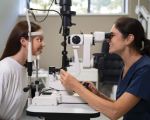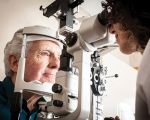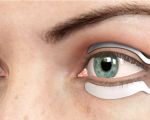How Nutrition Affects Eye Health
Our eyes are often the most overlooked part of our body when it comes to nutrition. We may be focused on eating the right foods for our heart or skin, but the importance of a nutrient-rich diet for eye health is often underestimated. Over the years, I’ve come to realize how crucial nutrition is when it comes to protecting and enhancing our vision. Many people don’t realize that what we eat can significantly impact our eye health and may even contribute to preventing common eye conditions. Let me take you on a journey through the relationship between nutrition and eye health, so you can make better dietary choices for your eyes.
The Role of Vitamins and Minerals in Eye Health
One of the most surprising things I’ve learned is just how important certain vitamins and minerals are for maintaining healthy vision. A nutrient-rich diet helps the eyes function at their best and prevents various issues like cataracts and macular degeneration. The key players in eye health are vitamins A, C, E, and certain antioxidants, as well as minerals like zinc and omega-3 fatty acids. These nutrients work together to support the eyes and protect them from damage. Let’s break them down:
Vitamin A and Beta-Carotene
Vitamin A is essential for maintaining good vision, particularly in low-light conditions. I remember reading about a friend who struggled with night blindness, and after increasing his intake of vitamin A-rich foods, he noticed a significant improvement. Vitamin A helps produce the pigment in the retina that is responsible for light detection. Foods like carrots, sweet potatoes, and spinach are excellent sources of vitamin A, and they also contain beta-carotene, an antioxidant that can help prevent eye diseases like cataracts.
Vitamin C and Eye Protection
Vitamin C is well-known for its immune-boosting properties, but did you know that it’s also important for your eyes? I first discovered this fact when I was researching how to prevent eye strain from long hours of screen use. Vitamin C plays a role in maintaining the health of blood vessels in the eyes, and it can help reduce the risk of cataracts and age-related macular degeneration (AMD). Foods like citrus fruits, strawberries, and bell peppers are excellent sources of vitamin C and can be easily incorporated into your daily diet.
Vitamin E and Antioxidants
Vitamin E is another important nutrient for protecting our eyes from oxidative stress. I was surprised to learn that oxidative stress, which occurs when free radicals damage the cells in our body, is a key contributor to age-related vision problems. Vitamin E acts as an antioxidant, neutralizing these harmful free radicals and protecting the cells in the eyes. Nuts, seeds, and leafy greens like kale are rich in vitamin E and should be a staple in your diet.
Zinc and Macular Health
Zinc is an essential mineral that supports healthy vision, especially the macula – the part of the eye responsible for sharp, central vision. I learned about the significance of zinc when a friend’s ophthalmologist recommended taking a zinc supplement to slow the progression of AMD. Zinc helps maintain the health of the retina, and a deficiency in zinc can lead to serious vision problems. Foods like oysters, beef, and pumpkin seeds are great sources of zinc.
Essential Fatty Acids and Their Impact on Vision
One of the most fascinating things I’ve discovered is the role of omega-3 fatty acids in maintaining eye health. Omega-3s are crucial for the development and function of the retina, and they can even help prevent dry eye syndrome. I remember when I started incorporating more omega-3-rich foods like fatty fish (salmon, mackerel, sardines) and flaxseeds into my diet. It made a noticeable difference in my eye comfort, especially after long days at the computer. Omega-3s also have anti-inflammatory properties, which can reduce the risk of eye diseases like AMD and diabetic retinopathy.
The Impact of a Balanced Diet on Eye Disease Prevention
Besides specific vitamins and minerals, maintaining a balanced diet is crucial for eye health. A well-rounded diet rich in fruits, vegetables, whole grains, and healthy fats not only supports overall health but also reduces the risk of developing eye diseases. I’ve personally experienced how changes in diet can improve eye comfort and function. As I’ve learned more about eye health, I’ve started focusing on reducing processed foods and sugars, which can increase the risk of conditions like diabetic retinopathy, which is linked to high blood sugar levels.
Foods to Include in Your Diet for Optimal Eye Health
Here’s a list of some of my favorite foods that I make sure to include in my diet to support eye health:
- Carrots: Rich in beta-carotene, a precursor to vitamin A, which supports good vision and eye health.
- Spinach and Kale: Packed with lutein and zeaxanthin, two powerful antioxidants that help filter harmful blue light and protect the retina.
- Blueberries: Full of antioxidants that help prevent oxidative stress and reduce the risk of cataracts and AMD.
- Salmon: A great source of omega-3 fatty acids that support retina health and protect against dry eye syndrome.
- Sweet Potatoes: High in vitamin A and beta-carotene, helping to maintain night vision and overall eye function.
The Bottom Line: A Holistic Approach to Eye Health
Looking back, I can confidently say that my vision has improved with the right combination of nutrients in my diet. It’s not just about taking supplements or eating a few healthy foods—it’s about making consistent, balanced dietary choices that prioritize eye health. I encourage you to start paying attention to the foods you eat and how they impact your vision. With a few simple changes, you can help protect your eyes for years to come.








